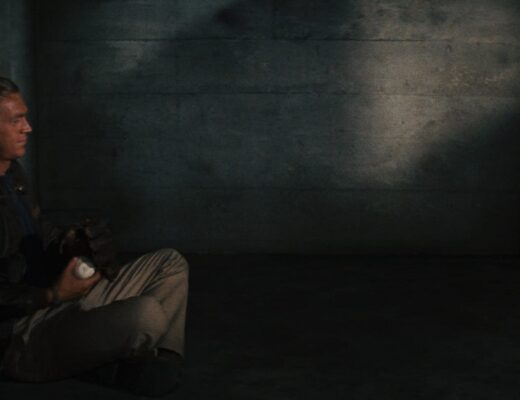Like Fences before it, Ma Rainey’s Black Bottom is another well-intention August Wilson adaptation that can’t seem to rise above its stagy origins.
Adapted from the 1982 stage play by Pulitzer Prize-winning playwright August Wilson, Ma Rainey’s Black Bottom is a film that stubbornly refuses to shake its theatrical roots. Director George C. Wolfe strives mightily to make the material cinematic, trying any number of tricks at his disposal, from elaborate crane shots to restless handheld camera movements to the use of a Steadicam that gracefully bobs and weaves between the members of his sprawling cast as they sing, dance, converse, and soliloquize. Even more successful are the film’s complicated long takes, which are interspersed with an almost Michael Bay-level of quick cutting; the energy it brings encourages an ebullience in viewers that’s likely of a similar (if lesser) character to what 1920s audience members felt when experiencing firsthand the titular “Mother of the Blues.” Yet, as was the case with Denzel Washington’s 2016 adaptation of another Wilson play, Fences, there’s a theatricality implicit within Wilson’s dialogue that tethers it to the stage, the line readings rendered inorganic in any other setting. The adaptation approach is likewise similar to Fences, as screenwriter Ruben Santiago-Hudson opts to leave much of the dialogue as he found it, which is certainly understandable: Wilson’s words are both eloquent and forceful, and any attempt to improve upon his linguistic genius would take a level of chutzpah that few screenwriters possess.
And therein lies the problem: this adaptation, like Fences before it, feels respectful yet bloodless, unwilling to risk much in cinematic transposition, and thus putting all of the responsibility on the performers to provide the juice. It’s the same problem audiences have watched play out across any number of film adaptations of Shakespeare, and so it’s not surprising that the most memorable efforts have come courtesy of visionary directors such as Baz Luhrmann and Michael Almereyda, who have spun the Bard’s texts into singular works of art unafraid to take formal and translative chances. To that point, Spike Lee has teased for years of his desire to adapt Wilson’s work; Ma Rainey, meanwhile, is brought to you by the director of the Nicholas Sparks’ adaptation Nights in Rodanthe. You get what you pay for, in other words. But that’s not to say that Ma Rainey’s Black Bottom isn’t still a partially successful adaptation, if only for the pleasure of hearing Wilson’s bracing words delivered by such acting powerhouses as Viola Davis and the late Chadwick Boseman, here in his final film role. In fact, Boseman delivers what could be the strongest performance of his career, a live wire act that ping pongs from manic, violent outbursts to soulful, tear-streaked monologues, from carnal lusting to tragic resignation at a moment’s notice. Davis opts for outsized scenery-chewing, a performance as loud and garish as her slathered makeup, all dark eye shadow, rosy cheeks, and painted-on eyebrows — this is all supported by a not-entirely-believable fat suit and a couple low-cut dresses that accentuate her heaving, sweat-glistened bust. (The less said about her lip-syncing, the better.) The lead duo’s efforts reflect a performative staginess that doesn’t entirely work within the cinematic setting, even as they remain entertaining, accomplished efforts. That dissonance is further punctuated when considered alongside the work from co-stars Colman Domingo, Glynn Turman, and Michael Pott, who deliver all no less affecting but comparatively more subdued performances.
It’s this lack of consistency that suggests Wolfe and his team weren’t all entirely on the same page, which makes for a frustrating viewing experience. Ma Rainey’s digital filmmaking likewise serves to highlight the artifice of the entire production, lending the ironic semblance of a stage play despite all of Wolfe’s nifty camerawork. And yet, Wilson’s words consistently make their way to the fore; he has remarkable ability to effortlessly and eloquently weave such varied topics as race, religion, art, and the exploitation of black artists at the hands of the white man into a powerful unity. That all of this is accomplished in a narrative that simply chronicles a single recording session from Ma and her band, and in an economical 90 minutes at that, is a special feat. Wilson’s work is as relevant in 2020 as it ever was, revealing both the subtle and obvious ways that power is wielded to stir anger and hopelessness, which is in turn too often unleashed upon those facing the very same struggles and hardships; thus, the too-familiar cycles of violence and hate. Someday Wilson will get the adaptation his work so rightfully deserves; until then we will have to contend with respectable, well-intentioned attempts like Ma Rainey’s Black Bottom, which is adequate and not much else.
You can currently stream George C. Wolfe’s Ma Rainey’s Black Bottom on Netflix.







